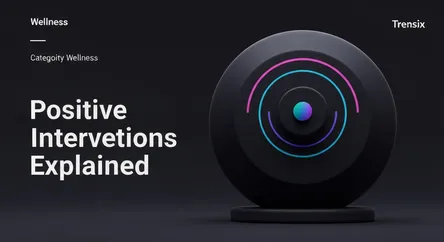Wellness
Positive Interventions Explained

Discover simple, science-backed exercises designed to boost happiness, increase well-being, and build mental resilience.
What is it?
Positive Interventions, often called Positive Psychology Interventions (PPIs), are evidence-based strategies and intentional activities designed to increase positive emotions, thoughts, and behaviors. Rather than focusing on fixing what is wrong, they aim to cultivate well-being and help individuals flourish. Common examples include practicing gratitude by keeping a journal, performing random acts of kindness, identifying and using personal strengths, and practicing mindfulness meditation. These techniques are practical tools intended to build lasting happiness and life satisfaction by shifting focus toward the positive aspects of life.
Why is it trending?
The rise of positive interventions is linked to a growing global emphasis on mental health and proactive self-care. In a shift from traditional psychology's focus on illness, positive psychology concentrates on what makes life worth living. These interventions are popular because they are accessible, often require no professional guidance, and are backed by extensive scientific research demonstrating their effectiveness. As people seek manageable ways to combat stress and anxiety, simple, structured exercises that are proven to boost well-being have become highly appealing for personal and even workplace development.
How does it affect people?
Engaging in positive interventions can lead to significant improvements in overall well-being. Meta-analyses of numerous studies have shown that these practices reliably reduce symptoms of depression, anxiety, and stress. On a personal level, people often report higher levels of happiness, optimism, and life satisfaction. These activities also help build resilience, enabling individuals to cope more effectively with life's challenges. By fostering positive emotions and strengthening relationships, these simple exercises empower people to take active control of their mental health and lead more fulfilling lives.